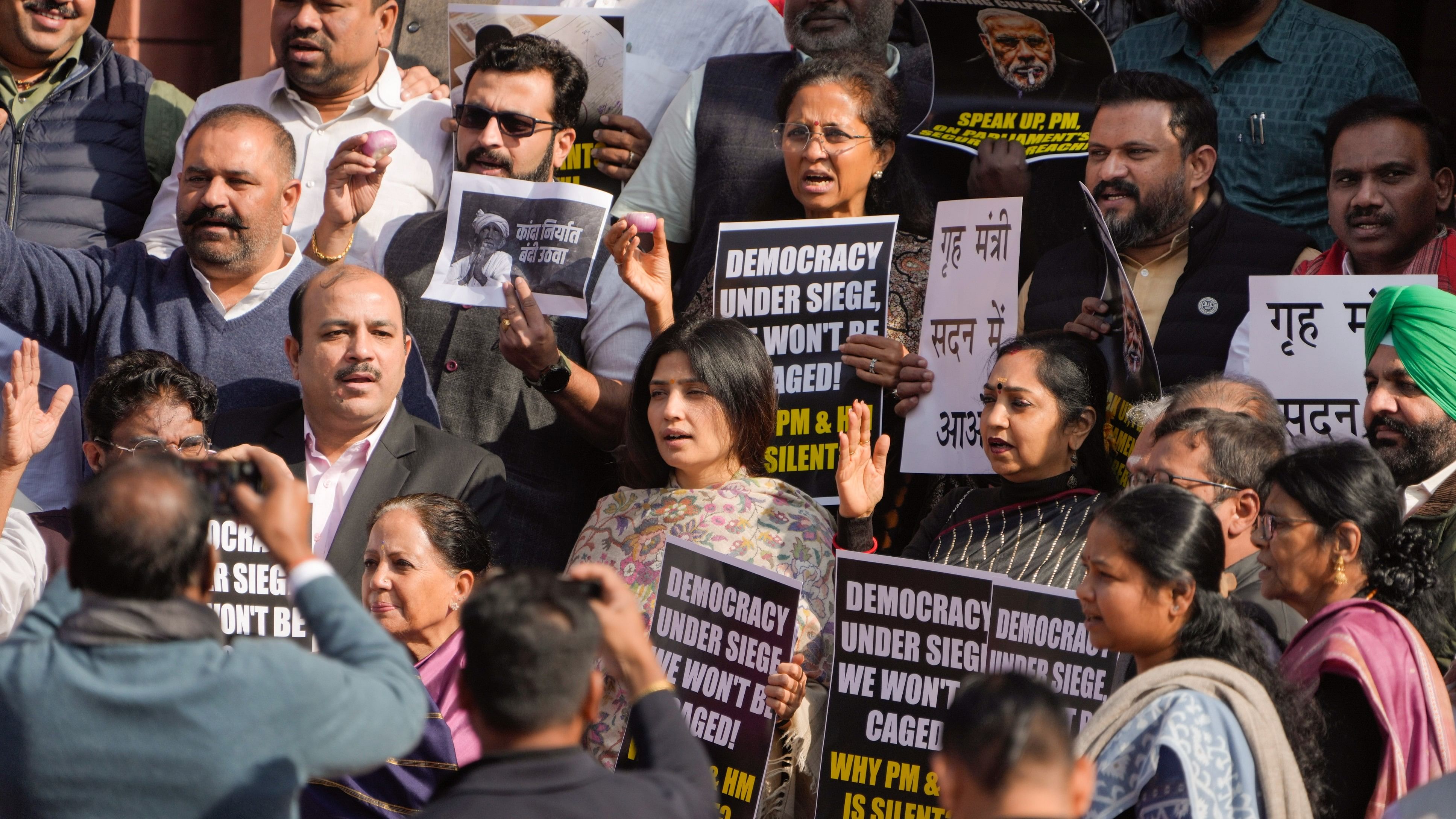
Suspended opposition MPs protest during the Winter session of Parliament.
Credit: PTI Photo
In a parliamentary democracy, the Opposition acts as a watchdog holding the government accountable for its decisions.
The mass suspension of 141 opposition Members of Parliament (MPs) from both the Lok Sabha and the Rajya Sabha — the first time in India’s history — does not augur well for our democracy.
The move exhibits the unbridled powers of a ruling party having a brute majority in Parliament. In the past, such large-scale suspensions took place when the Congress government, led by the then Prime Minister Rajiv Gandhi, had an overwhelming majority in Parliament.
It happened on March 15, 1989, when 63 opposition members were suspended after they created a ruckus over the tabling of the Thakkar Commission report into the assassination of former Prime Minister Indira Gandhi. The panel raised doubts about the role of her close aide R K Dhawan, and the Opposition wanted a thorough discussion on the issue. The government, however, did not relent.
More than 34 years later, the ruling Bharatiya Janata Party (BJP) seems to be following in the Congress’ footsteps.
In 2015, then Parliamentary Affairs Minister M Venkaiah Naidu reminded the Congress of 1989 when 25 Opposition MPs were suspended for creating disturbance and obstructing proceedings in Parliament. “Who set the record and the benchmark,” was his response to the Congress when its members protested the suspensions. This was one year after the BJP stormed to power at the Centre with Narendra Modi as the Prime Minister in 2014.
This time, the Opposition was demanding a statement from Union Home Minister Amit Shah regarding the incident on December 13 when protesters jumped into the Lok Sabha from the visitors’ gallery, releasing a gas and shouting anti-establishment slogans before they were subdued by the MPs.
In a separate incident outside Parliament the same day, two protesters were taken into custody by the Delhi Police for a similar demonstration with gas canisters.
The conduct of the Opposition seeking a response from the government can be questioned but at the same time, their demand for the home minister’s statement cannot be termed unparliamentary.
Since both Prime Minister Narendra Modi and Shah have spoken on the issue outside Parliament, the Opposition is citing norms and past precedence to justify their demand. Moreover, the onus of running Parliament is on the ruling side.
From 2014 onwards, there have been many occasions when Parliament witnessed a breakdown of the working relationship between the government and the Opposition. The collapse of a formal line of communications and even back-channel informal negotiations resulted in frequent disruptions in Parliament. This is also a deviation from the past when the two sides would sit and find a solution to break the logjam.
The BJP, when it was in the Opposition from 2004 to 2014, stalled House proceedings on many occasions. The 2010 winter session was washed out after the opposition parties, led by the BJP, paralysed proceedings demanding a joint parliamentary committee (JPC) probe into the 2G spectrum allocation. The Congress-led United Progressive Alliance (UPA) government relented in the budget session by announcing a JPC probe into the matter. As records indicate, no opposition member was suspended from Parliament at that time.
The suspensions over the past few days have taken place close on the heels of the BJP registering stunning victories in the recent assembly elections in Madhya Pradesh, Rajasthan, and Chhattisgarh. Emboldened by these wins, the BJP feels that the 2024 elections are just a formality because the BJP will win when the results come out.
Perhaps, the reason why the opposition leaders claim that the ruling party has become arrogant after the election results and wants to bulldoze important Bills without any dissent in an Opposition-less Parliament.
The Modi government has justified the suspensions, arguing that the opposition members have insulted both Rajya Sabha chairman Jagdeep Dhankhar and Lok Sabha Speaker Om Birla and the institution of Parliament.
That said, the suspensions have united a fragmented Opposition, which some weeks ago looked completely in disarray. The opposition parties have visibly closed ranks and at its fourth meeting in Delhi on December 19, the I.N.D.I.A. (Indian National Developmental Inclusive Alliance) bloc decided to hold nationwide agitations on December 22 in protest against the move.
As of now, it seems both sides are trying to score a political point with the Lok Sabha elections barely three months away. But the casualty due to this deadlock is Parliament and the people of this country.
(Aurangzeb Naqshbandi is a senior journalist who has been covering the Congress for 15 years, and is currently associated with Pixstory.)
Disclaimer: The views expressed above are the author's own. They do not necessarily reflect the views of DH.